Tina Arena speaks out on behalf of arts, music industry hit hard by COVID-19
The coronavirus pandemic has up-ended society, all but decimated the international arts scene and lit yet another fire under Australian music icon Tina Arena, who explains just how much her industry needs the support of the nation right now.
Stellar
Don't miss out on the headlines from Stellar. Followed categories will be added to My News.
Ladies and gentlemen, meet QuaranTina Arena. The beloved Australian singer scored her isolation-appropriate nickname after fan Jack Peacock mocked up a photo of her with gloves and a surgical mask.
“I laughed my head off when I saw it,” Arena tells Stellar from Melbourne, where she – like much of the country – is in lockdown.
“I’ve always had a sense of humour. Do you think I would have lasted four-and-a-half decades in the music industry without one? I’d be six feet under the f**king ground by now!”
In recent weeks, Arena has spent the bulk of her time cooking, reading and making the occasional heartbreaking drive-by to safely drop off supplies and wave at her elderly parents from the car.
She’s also homeschooling her teenage son Gabriel, and in the process waging a losing war with his Xbox.
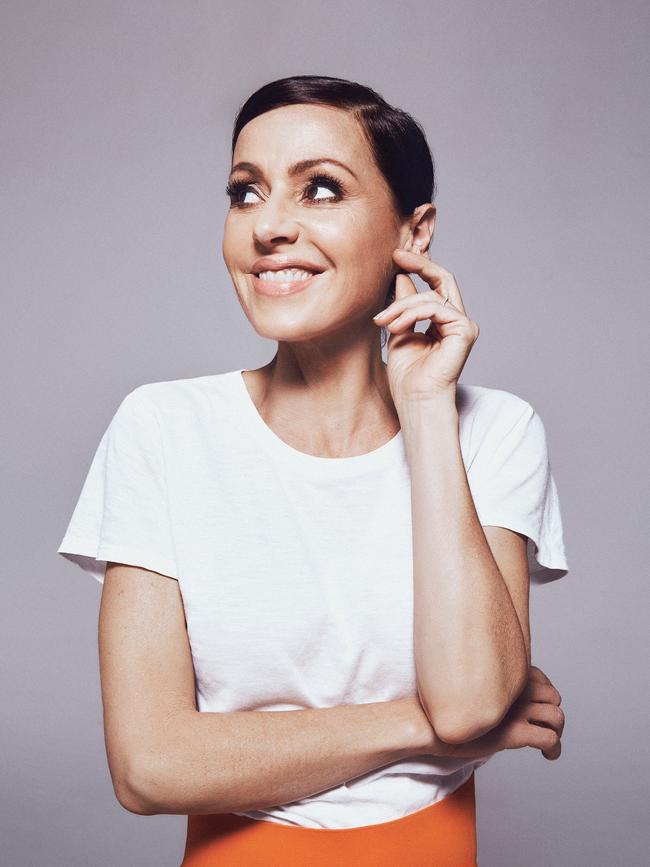
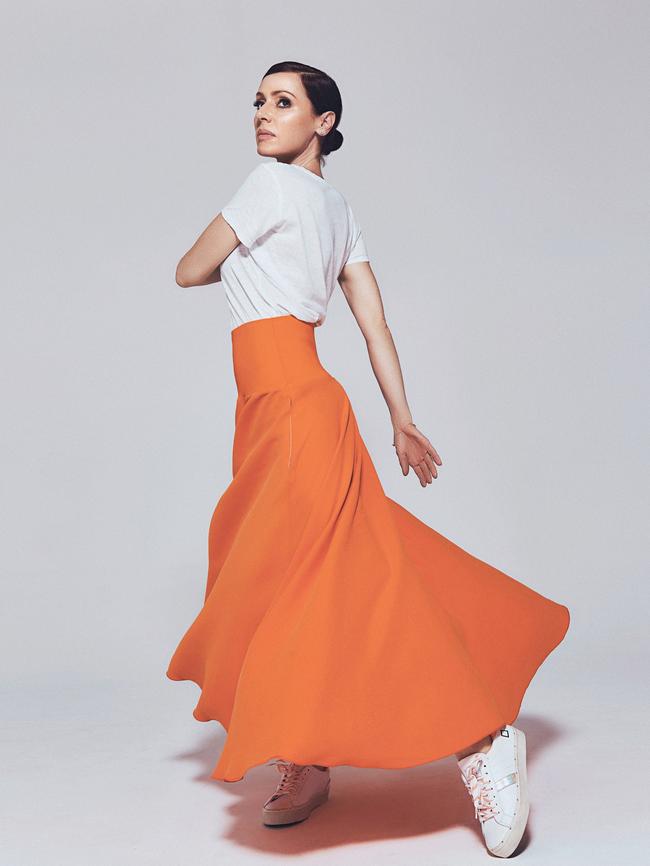
“I’m struggling,” she admits.
“I’ve got emails from teachers saying, ‘Gabriel hasn’t handed in this and that …’ but we will get there. Our kids are traumatised. They can’t see their mates, it’s tough.
“But my parents lived through a war, my grandparents fought in the war, Gabriel’s great-grandfather hid the Jewish people from the Nazis so they wouldn’t be slaughtered. We are a family that has experienced that kind of pain.
“And all we’re asking is for people to stay home, watch a film. It’s not that hard. Then I see people at the beach and I want to rip every hair out of my head. It’s an extraordinary lack of respect for others.”
There’s something else occupying her downtime – Instagram Live sessions, several times a week. Not to sing, rather to run a topical talk show that features deep conversations with everyone from her Young Talent Time television father Johnny Young to comedian Julia Morris and local drag queen Philmah Bocks, who performed a version of Arena’s smash hit ‘Chains’.
The sessions are unfiltered and refreshingly honest.
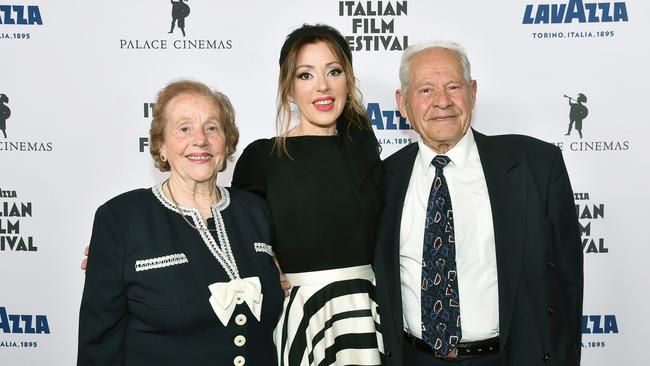
“I found solace in just talking to people – and listening,” Arena says.
“The expectation is because I’m a singer, you’ll just sing. There are a lot of performers doing that, which is terrific. But people also need to understand that we’ve lost our jobs, too; we have no job security whatsoever. I’ve grown up working in a very uncertain industry.
“Many have been dismissive of these kind of hardcore conversations, which I’ve been having for a while. It’s time to talk about these things, when the work has dried up and people are going, ‘F**k, what do we do?’”
With Morris, for instance, she discussed how the arts has been decimated by the coronavirus crisis – with concerts, theatre performances, television shows, festivals and even lucrative corporate work disappearing overnight, with no resumption in immediate sight.
“I haven’t worked for a year and a half,” Arena says.
“This is a very serious thing for me. I’ve got a mortgage to pay. I had to tell the bank I need to freeze my loan, I can’t pay right now.
“I’m not going to panic about it – I’m not alone. There are millions of us who can’t afford to make those repayments right now. So the government needs to put things in place in order to protect us. We can’t all lose our homes at the same time, that’s not possible.
“The arts industry is being categorically ignored. The number of people who have lost their jobs in our industry is extraordinary. I’m checking on my friends constantly; some aren’t doing well.”
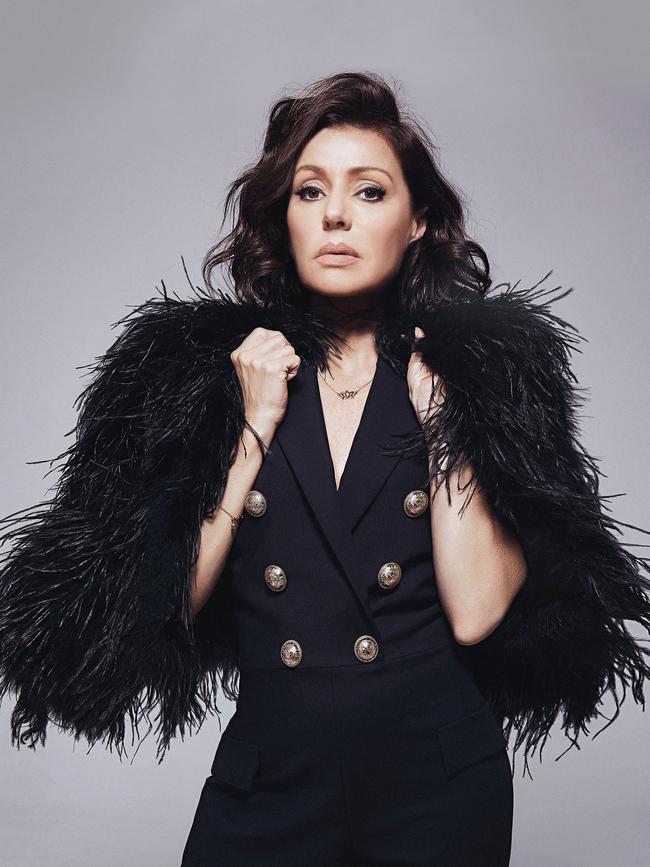
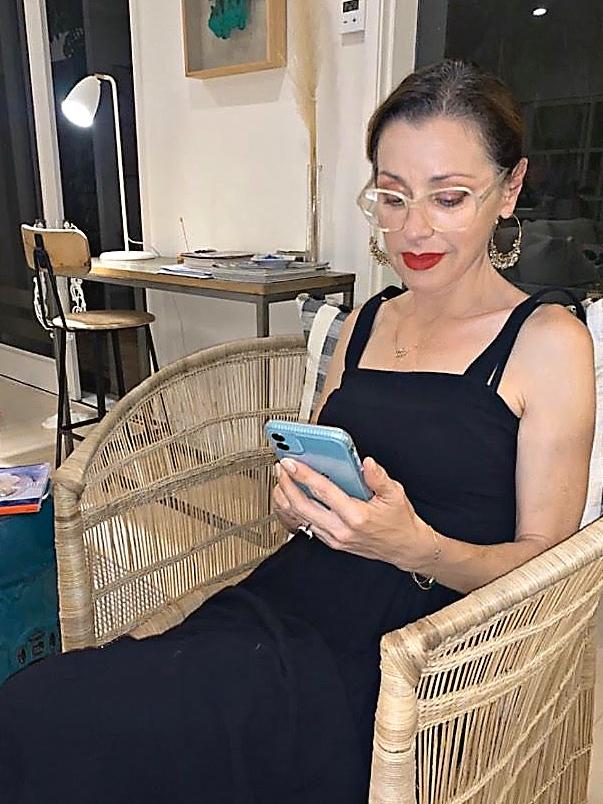
Globally, the German government has offered a $50 billion (AU$90 billion) bailout to arts and cultural businesses as well as grants, the UK has created a £160 million (AU$323 million) emergency package for the cultural sector, and Switzerland has offered 280 million Swiss francs (AU$475 million) to the arts and culture sector in the form of non-repayable emergency aid.
A website called I Lost My Gig Australia was set up as a way for those – not just musicians, but everyone from security staff and merchandise sellers to production crew, booking agents, hospitality workers, managers, photographers and publicists – to log how much work has evaporated. It’s already tracked more than $330 million in lost wages.
Live Performance Australia expects the fallout to nudge closer to half a billion dollars, and calculates that the sector itself is worth $4 billion a year. They have lobbied the government for an $850 million bailout.
This week the arts industry got a $27 million rescue package, including $17 million for regional and Indigenous arts groups and $10 million for charity Support Act.
Arena says the money is a good first step, but notes that many in her industry fall through the cracks of the Job Seeker and Job Keeper payments due to being freelance employees working from gig to gig.
“The Government know $27 million won’t bail out the whole sector,” Arena said. “We have to be grateful for that but we need more money, there’s still a long way to go.”
MORE STELLAR:
The promise David Campbell made to his kids about COVID-19
Exclusive: Michelle Bridges breaks her silence
The singer famously has the government’s ear. She is Scott Morrison’s favourite singer – the Prime Minister came to see her last major job, a starring role in Evita at the Sydney Opera House in 2018, and she has called him out on Instagram over inaction on bushfires and his handling of the virus.
More substantively, last year Arena became a board member of the Australia Council, the Federal Government’s principal arts funding body. She knows this gives her extra power at a time like this.
“I have expressed my concerns [to the government] and I will continue to,” she tells Stellar.
“Being a politician is a job none of us would want to be doing right now. The politicians are in uncharted waters; we must be respectful that they are struggling to navigate them. We need to be compassionate and supportive, but also be smart and use our own brains and stay home to stop this spreading.”
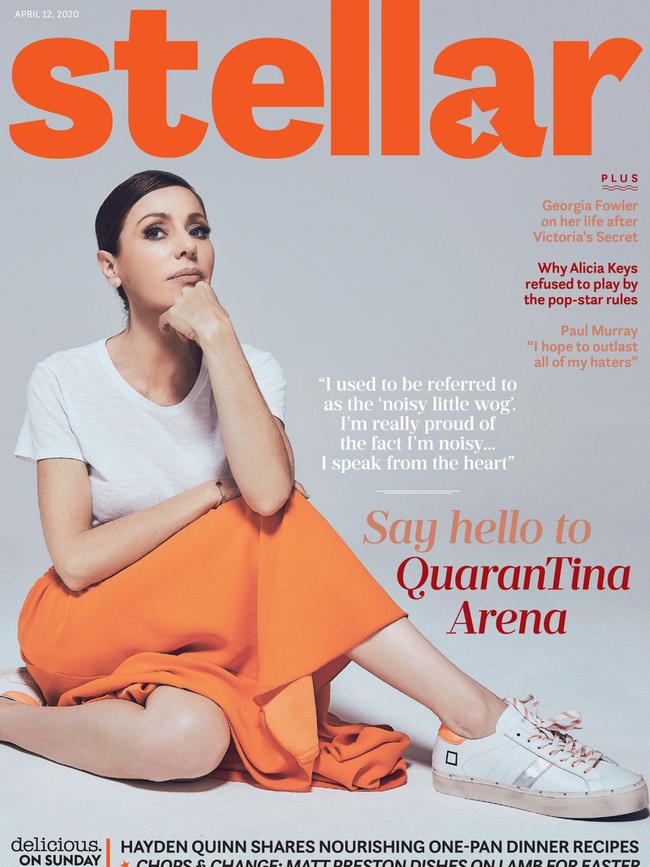
But, she points out, “They have to do something. The arts community of Australia do not need to be on suicide watch. If it continues, that’s what is going to happen. It’s really serious.
“Support Act is a charity that supports the industry in times of need; they are fundamental, and I have been very vocal telling the government they need to inject cash into that charity now. Now! We cannot wait. I’m hoping that will happen very soon to immediately alleviate some pain.
“We are an industry that is beneficial during this time to heal people. And when something goes wrong, we are the first to pull our sleeves up and offer our services to help out.
“I’ve been banging on about this for so many years. I used to be referred to as the ‘noisy little wog’. I’m really proud of the fact I’m noisy; I don’t give a sh*t. I speak from the heart.”
“Why on earth does the arts industry continue to get treated like that?” she adds. “We have to say no. The bullsh*t stops now. Maybe this is a turning point. It’s time.”
Indeed, Arena says if there is a positive to come from this crisis, it could be how artists are treated by the major corporations who benefit from their art.
She continues to call out Australian radio for not playing enough local artists.
“They have been very reticent to support the Australian industry, I want them to pull their fingers out now. It’s just not good enough. They’ll tell you they have a quota of Australian music they play, which is a small quota, and they’re respecting that quota. That’s not the answer I want right now. It’s not a personal attack on anyone in radio, it’s about the mentality. It’s been like that for decades. And this is the moment that mentality and that culture needs to cease.”

Similarly, Arena wants content creators to be rewarded after years of earning literally cents from lucrative streaming sites owned by tech giants or poor royalty rates from record companies.
“The general public have no idea about how the industry really works,’’ Arena said.
“Big corporations like Apple, Google, Amazon, Spotify and YouTube are making the money in music right now.
“Same as record companies – our music is still being streamed while musicians are at home getting no wages because they can’t tour and the labels are all still filling their coffers. Most artists make very, very little from streaming.
“Art is an essential part of the human experience. Especially now, everyone is listening to music, watching films and TV, reading books. There has to be a better collaboration between the artists and the big corporations that re-empowers the content creators. It’s that art that people are turning to now, and it’s fair to say artists aren’t getting properly renumerated for that, while the major corporations are still making a lot of money.
“Now it’s time to redesign that. We need to come up with a better template where everyone’s happy.”
READ MORE EXCLUSIVES FROM STELLAR.
Stylist: Nicholas Lord @nwl_creative
Photographer: Bernard Gueit @bernardgueitstudios
Makeup and hair: Huw James @huwwitha_w
White tee and orange skirt Country Road @countryroad
Shoes @edwardmellershoes
Black coat and black jumpsuit Grace boutique @gracemelbourne
Originally published as Tina Arena speaks out on behalf of arts, music industry hit hard by COVID-19
